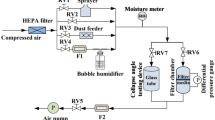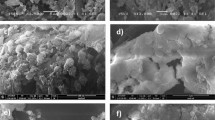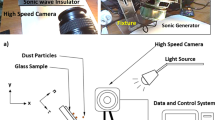Abstract
THE electrical breakdown of a gap bridged by dust deposits is frequently ascribed to the presence of the dust, bub little information on the conductivity characteristics of dust is available. These characteristics were therefore investigated for a typical sample of the following composition : volatile matter (oils), carbon, moisture, 55 per cent; metals and oxides (iron, copper, brass, iron and copper oxides), 36 per cent ; residue, complex silicates (clay), 9 per cent.
This is a preview of subscription content, access via your institution
Access options
Subscribe to this journal
Receive 51 print issues and online access
$199.00 per year
only $3.90 per issue
Buy this article
- Purchase on Springer Link
- Instant access to full article PDF
Prices may be subject to local taxes which are calculated during checkout
Similar content being viewed by others
References
Maurer, R. J., J. Appl. Phys., 16, 563 (1945).
Fairweather, A., J. Inst. Elect. Eng., 89 (I), 499 (1942).
Güntherschulze, A., Z. phys., 86, 778 (1933).
Fröhlich, H., Nature, 158, 332 (1946).
Dèchêne, G., C. R. Acad. Sci. Paris, 200, 648 (1935).
Author information
Authors and Affiliations
Rights and permissions
About this article
Cite this article
GOLDSCHMIDT, K. Conductivity Hysteresis of Dust Deposits. Nature 159, 815–816 (1947). https://doi.org/10.1038/159815a0
Issue Date:
DOI: https://doi.org/10.1038/159815a0
Comments
By submitting a comment you agree to abide by our Terms and Community Guidelines. If you find something abusive or that does not comply with our terms or guidelines please flag it as inappropriate.



